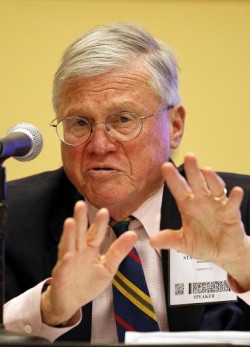Dissident criminal defense lawyers in China face many dangers, says researcher

Stanley Lubman of the Miller Institute for
Global Challenges and the Law
Photo by Tony Avelar
American lawyers often complain that they are held in low esteem by the general public. For a small cadre of Chinese lawyers, it would be a luxury to focus their worries on what people think of them.
For these lawyers, who are politically motivated to practice criminal defense law, the risks include punishment by their professional associations; actions by state security agencies; imprisonment; and even “black muggings”–beatings and other attacks by thugs who never seem to be identified or prosecuted.
“Chinese lawyers look up to American lawyers so intently and so sincerely that you can’t do anything but want to help them,” said David E. Taylor, legal counsel to China Aid in Columbia, S.C., which provides support to Chinese lawyers and other political dissidents.
Taylor spoke at a Friday program sponsored by the ABA Section of International Law at the association’s 2013 Annual Meeting in San Francisco. The program was intriguingly titled “Dancing Handcuffed in a Minefield: China’s Hidden Heroes in the Criminal Defense Bar.”
“As recently as 2007, lawyers were beaten up inside courtrooms,” said Taylor. “It hasn’t stopped. We just don’t see it reported so much anymore. We need to pay more attention to what’s happening on the other side of the world.”
The number of lawyers with strong liberal political motivations is miniscule, perhaps 100 out of China’s 250,000 lawyers, said researcher Terence C. Halliday.
Halliday’s findings are based on his study of criminal defense lawyers in China over the past eight years. Halliday is in the process of writing a report. He is the co-director of the Center on Law and Globalization, a partnership between the American Bar Foundation, the ABA’s research affiliate, and the University of Illinois College of Law in Champaign-Urbana.
Despite their small numbers, politically liberal criminal defense lawyers draw intense scrutiny from the Chinese government, security agencies and even their professional associations, said Halliday. Their work often focuses on such issues as environmental pollution, tainted food, forced evictions, freedom of speech and religion, and HIV. Many of them come from religious backgrounds, often Christian.
In the face of persecution and threats from the government, however, these lawyers often display a surprisingly positive outlook, said Halliday. During interviews with some of them, he heard such comments as “when I see injustice, I have to speak out” and “my conscience demands I act” or “my fighting spirit is a calling from the Lord.”
A key question for the United States is how it should respond to repressive Chinese policies against dissidents, including lawyers. Another question is whether U.S. efforts will matter to the Chinese.
These issues should be raised with the Chinese government, said Stanley Lubman, a senior fellow at the Miller Institute for Global Challenges and the Law at the University of California, Berkeley. “But I don’t think anything we say will matter to those paranoid autocrats.”
Besides, said Taylor, the U.S. government may be reluctant to compromise its relations with China, which he described as America’s banker. “I don’t think the current administration is willing to do that at all,” he said.
But at some point, he said, “You have to take a position that is right, and you may find there is no middle ground. You have to let them know there will be consequences to their human rights failures.”



